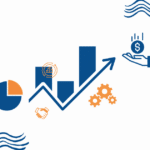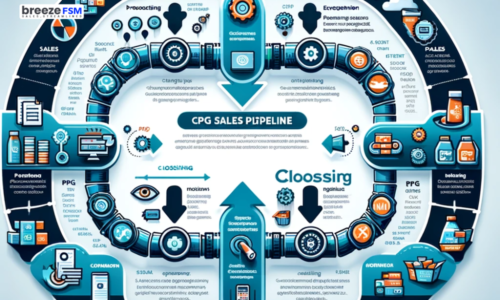- Payel Adhikary Ghosh
- 0 Comments
- 932 Views
Sales Force Automation or SFA vs. CRM automation has always created a dilemma in the sales world, where both terms are widely used in the industry. However, since these terms are often used interchangeably, people can become confused because both tools are integral parts of the sales process.
For instance, if your customer service team receives a ticket about a failure in certain app features, the complaint gets registered in your CRM tool. Your team needs to understand the problem and resolve the ticket as soon as possible. This entire process is conducted with the objective of satisfying your customer or user.
To achieve the quarterly sales targets set by your leadership team, you look into the end-to-end sales workflow. This includes managing leads, assigning leads to the right sales agents, planning a beat plan to assign territories to your sales reps, tracking their daily performance in the field, closing deals, taking order details, and finally gathering customer details and requirements. This complete sales flow is streamlined by the Sales Force Automation tool.
In layman’s terms, Sales Force Automation is used for acquiring new clients, whereas CRM (Customer Relationship Management) is used to enhance satisfaction among your existing clients.
Though these terms indicate their distinct features, their functionalities overlap, which can be confusing. However, for a business, it is imperative to learn more about SFA vs CRM in detail. We have written this article to explain these tools in detail.
What is SFA in field sales?
Sales Force Automation (SFA) is a tool that digitizes your sales workflow. It’s particularly effective in the field sales space. SFA works wonders by analyzing your sales process, including the agents’ performance, beat planning, route optimization, order collection, client visits, competitor tracking, sales reports, and analytics.
The main goal of an SFA tool is to shift the focus of sales agents and managers from repetitive, mundane tasks to more important tasks, like selling more. SFA automates tasks that don’t require much human intervention, freeing up your sales team to boost their productivity and efficiency.
What is CRM in field sales?
CRM in field sales is a bit different from how it is normally used. In field sales, mobile CRM is particularly appreciated. Mobile CRM is a tool that sales managers and agents can use for lead management on the go. It’s quite similar to its desktop counterpart but especially useful for those in the field.
Sales agents use CRM automation to plan their day in a structured way. For example, they can manage the leads they need to visit, record conversations from meetings, keep track of updates regarding the leads, update lead statuses, and identify more potential leads in the area. All these tasks can be managed through a CRM.
What’s the difference between SFA vs CRM?
SFA focuses more on sales behavior, whereas CRM is more focused on customer behavior.
There are tons of different ways to Sales Force Automation (SFA) and Customer Relationship Management (CRM) are terms that serve different purposes. SFA is all about making sales tasks easier. It helps with things like managing leads, tracking opportunities, and forecasting sales. In short, it makes the sales process more efficient by automating repetitive tasks.
CRM, on the other hand, covers a broader range of activities. Its main goal is to manage all interactions with customers throughout their journey with your company. CRM systems store valuable customer data that you can use for analysis and personalized communication.
SFA increases sales productivity, whereas CRM elevates customer satisfaction.
SFA streamlines repetitive tasks and shifts the focus more towards conversion and revenue generation. To achieve this, it automates the entire sales process, including assigning leads, territory mapping, analyzing past data, and providing more concrete advice for higher close rates.
CRM brings all customer data to a centralized hub and analyzes the conversations that took place in meetings. This data is then used to build personalized offerings and product enhancements, all with the goal of engaging customers and improving their experience.
SFA is high on analytics game with objective to generate more revenue
When it comes to analyzing the vast amount of data from different outlets, SFA is the best tool for the job. It gathers all the data in one place, validates it, and generates reports that help sales agents convert as many deals as possible. Often, the SFA tool assists agents in promoting SKUs according to customer preferences.
On the other hand, CRM analysis is mainly based on customer behavior. It focuses on activities that can enhance customer satisfaction, such as checking on prospects and providing detailed information on leads. CRM is primarily used for sustaining the relationships built over time with clients.
Checklist for Choosing Between Sales Force Automation (SFA) and Customer Relationship Management (CRM)
- Identify Business Needs- Determine your primary focus: sales task automation (SFA) or comprehensive customer interaction management (CRM).
- Assess Sales Team Size- Evaluate the number of sales agents and managers in your team.
- Analyze Sales Process Complexity- Understand the complexity of your sales workflow and the specific tasks involved.
- Consider Customization Requirements – Identify the level of customization needed for your sales process and customer interactions.
- Feature Evaluation – Compare the unique features of SFA and CRM
- Focus Area- Decide if you need: SFA for automating repetitive sales tasks and enhancing conversion rates or CRM for managing and sustaining customer relationships and improving satisfaction.
- Scalability – Ensure the chosen tool can scale with your business growth.
- Integration – Check the ease of integration with existing systems and platforms.
- Long-term Efficiency- Consider how the tool will streamline operations and enhance efficiency over time.
- Business Objectives Alignment- Verify that the tool aligns with your overall business goals and objectives.
Parting Thoughts
Whether to choose SFA or CRM automation depends entirely on your company’s specific demands. I would suggest that both are important in their own right. If you require a sales force automation tool to streamline your daily field sales workflow, you also need a mobile CRM to prevent any lead slippage by the sales agent. It’s essential to empower your team with a tool that’s easy to use, effective, and simplifies their work.
Breeze offers a powerful combination of both SFA and CRM functionalities. On one hand, it enables you to streamline your business by monitoring your team’s activities, optimizing routes, ensuring authentic attendance, and allowing your sales agents to manage the entire lead lifecycle seamlessly, without any manual intervention.
To learn more about Breeze, click here. And if you’re interested in improving your field sales process further, we’re happy to hear from you. Feel free to contact us.
Systems for customer relationship management (CRM) and sales force automation (SFA) are indispensable for enhancing a company’s sales process. CRM focuses on establishing and maintaining relationships with customers, while SFA is more concerned with automating sales tasks and processes.





